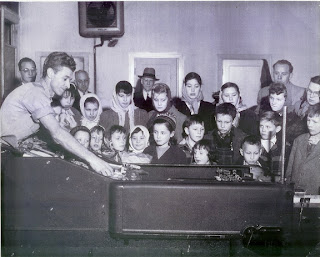Thomas Edison called it the 8th Wonder of the World. It was made of 10,000 parts - 5,483 of which were moving - and it used molten metal heated to 550 degrees. Mistakes landed in a "hell box" for recycling. The 7-year apprenticeship included 3 years to learn to operate it, plus 4 years to learn to fix it, because there were no technicians on call. The skilled craftsmen who operated it were well-paid and highly sought after; they could move and find work just about anywhere, and they created a labor union that was responsible for 8-hour workdays and 40-hour work weeks. OK, cousins, all together now -- what was it??
...A Linotype machine
(and the International Typographical Workers' Union)
Mastering this monster was my dad's occupation for about 30 years in a newspaper "Composing Room" -- and I think Mom's brothers Bert, Joe, and Ross did this, too, at least for a while? And Daddy's brother, Ab? Have I missed anyone? Daddy used to wear pants with a cuff on the bottom, and sometimes there would be metal parts n pieces carried home in his pant cuffs.
I just helped a friend create a book in Word and publish it on Amazon... such a far cry from this way of typesetting, but it was a true wonder in it's day, and unleashed the power of the printed word in way never before known. Here is a web site about a documentary film made last year, which also has links to several good sources. I hope to see the film soon: http://www.linotypefilm.com/
True story, from when I was very young: "Mommy, why does Daddy have to leave us and go to work?" Answer: "He has to make money, child, to buy groceries and clothes and take care of the family." Later... "Mommy, what does Daddy do when he goes to work?" Answer: "He's a printer, dear." Later still... "Little girl, what does your daddy do for a living?" Answer: "He prints money we can spend at the store." (Made perfect sense to me, but Mom had some explaining to do!)
Here's a photo of my dad, O.J. (Ollie James, sometimes called "Jolly Ollie" or "Beanpole"), demonstrat
Now I understand why he was always so insistent on good spelling: on a Linotype, there was no backspacing over an error - a whole "line of type" would have to be re-set just to correct a single character. But more than that, my father inspired me to learn a skill, "something that just everybody can't do." His was the mechanical age of Linotypes, mine was the emerging age of computers, but our two vastly different careers actually had much in common. The following essay about the delights of programming could very well have been written by the guys in the Composing Room a generation ago.
Why is programming [typesetting] fun?
Following is an extract from The Mythical Man-Month, by Frederick P. Brooks, Jr. It was first published in 1974 and republished in 1995. I kept a copy on my desk for years when I was a programmer at IBM, and it still speaks to why I spend so much time in front of a computer screen, tinkering with web pages, databases, and more... look at how easily the words can be exchanged:
(Begin
quote)
Why is programming [typesetting] fun? What delights may its practitioner expect as his reward?
First is the sheer joy of making things. As the child delights in his mud pie, so the adult enjoys building things, especially things of his own design. I think this delight must be an image of God's delight in making things, a delight shown in the distinctness and newness of each leaf and each snowflake.
Second is the pleasure of making things that are useful to other people. Deep within, we want others to use our work and to find it helpful. In this respect the programming system [typesetting process] is not essentially different from the child's first clay pencil holder "for Daddy's office."
Third is the fascination of fashioning complex puzzle-like objects of interlocking moving parts and watching them work in subtle cycles, playing out the consequences of principles built in from the beginning. The programmed computer [printed page] has all the fascination of the pinball machine or the jukebox mechanism, carried to the ultimate.
Fourth is the joy of always learning, which springs from the non-repeating nature of the task. In one way or another the problem is ever new, and its solver learns something: sometimes practical, sometimes theoretical, and sometimes both.
Finally, there is the delight of working in such a tractable medium. The programmer [printer], like the poet, works only slightly removed from pure thought-stuff. He builds his castles in the air, from air, creating by exertion of the imagination.
Few media of creation are so flexible, so easy to polish and rework, so readily capable of realizing grand conceptual structures. (...) Yet the program construct [Linotype machine], unlike the poet's words, is real in the sense that it moves and works, producing visible outputs separately from the construct itself. It prints results, draws pictures, produces sounds, moves arms.
The magic of myth and legend has come true in our time. One types the correct incantation on a keyboard, and a display screen [printed page] comes to life, showing things that never were nor could be.
Programming [typesetting], then, is fun because it gratifies creative longings built deep within us and delights sensibilities we have in common with all men.
(End
quote)
Thanks, Daddy...






No comments:
Post a Comment